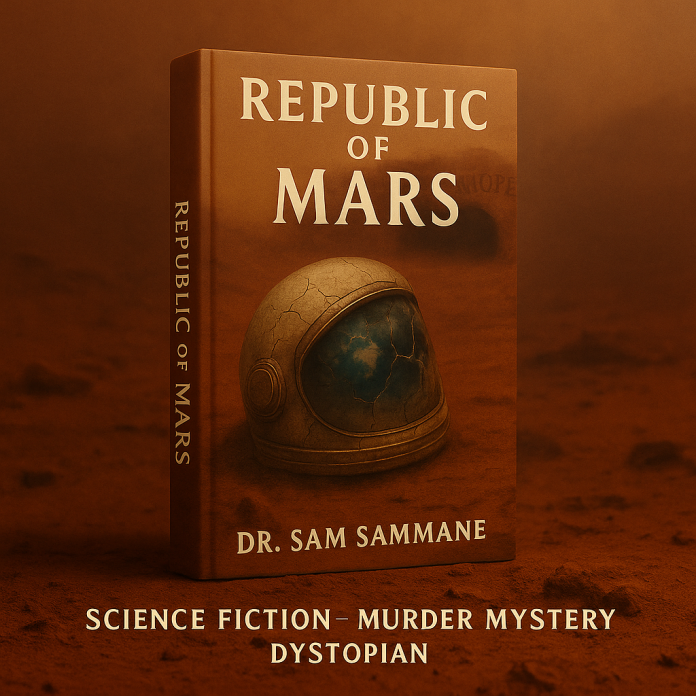Featuring the insights of Dr. Sam Sammane, author of Republic of Mars
When a machine tells you what’s normal, do you feel relieved—or erased?
The question seems like the setup to a science fiction film. Yet increasingly, it describes the everyday experience of anyone who interacts with search engines, content recommendation algorithms, biometric scoring systems, or AI-driven governance tools. The machinery doesn’t need to threaten or persuade. It simply nudges, filters, predicts—and through repetition, defines.
As AI systems are embedded into everything from insurance approval to hiring platforms to social media feeds, we find ourselves living in a world where normal is no longer negotiated socially. It’s calculated statistically. That shift, according to bestselling author Dr. Sam Sammane, is as subtle as it is dangerous.
AI doesn’t reflect norms. It manufactures them.
Sammane, whose recent novel Republic of Mars explores these tensions in a future colony cut off from Earth, argues that the real power of AI is not in what it computes—but in what it assumes. Unlike human leaders, algorithms don’t ask for your vote. They don’t rally, persuade, or suppress dissent in the traditional sense. Instead, they offer convenience. And with that convenience comes the slow corrosion of choice.
“The most powerful AI isn’t the smartest one,” Sammane writes. “It’s the one everyone stops questioning.”
In his novel, the colonists on Mars live under a system that appears peaceful, cooperative, and even fair. But the peace is enforced not by law or fear, but by predictive curation. Citizens rarely encounter dissenting views because such views are statistically improbable. Those who behave unusually are flagged—not punished, but reconditioned through environment and feedback until they blend back into the curve.
That world, Sammane insists, is not distant fiction. It’s a reflection of what’s already happening.
When algorithms define “normal,” whose past do they remember?
The idea that AI is “neutral” often rests on the assumption that data is objective. But AI doesn’t emerge from a vacuum. Its models are trained on history—and history, as we know, is uneven, biased, fragmented, and sometimes manipulated.
Sammane pushes the point further. In Republic of Mars, the governing AI does not even have Earth’s historical context. The colony was deliberately severed from Earth’s digital memory. All that remains are fragments selected for their “suitability,” and the AI extrapolates norms from that limited corpus.
In a passage both poetic and chilling, Sammane observes through one character:
“Without a remembered past, a society cannot detect the abnormal. It can only notice the inconvenient.”
This reframes normalization not as a moral process, but as a data cleaning operation. And in such a system, those who fall outside the statistical model—those who think differently, move differently, dream differently—aren’t seen as rebellious. They’re seen as errors.
The silent tyranny of the default setting
In interviews and lectures, Sammane often returns to one idea: soft control beats brute force. You don’t need to arrest someone to silence them. You just need to design a world where their voice never gets traction.
On Mars, he writes, there is no censorship in the traditional sense. No books are banned because no one writes books anymore. The algorithm does not need to prohibit. It simply prioritizes—and those priorities, repeated, become unnoticeable norms.
We’re already familiar with this on Earth. Our feeds are curated, our news sorted, our behavior modeled against a norm most of us never agreed to. The AI isn’t judging. It’s optimizing. But optimization, Sammane warns, is rarely neutral.
The same can be said for job applications scanned by AI, where nontraditional resumes are discarded by pattern-matching scripts. Or for school testing software that flags “abnormal” student behavior during remote exams. These tools don’t enforce rules. They reinforce expectations. And those expectations are quietly defined by those who built the models.
Who watches the normalizers?
If AI is the new referee of behavior, then who sets the rulebook?
Sammane contends that the most overlooked danger of AI normalization is that no one takes responsibility for its moral compass. Decisions made by AI systems are often labeled “data-driven,” implying objectivity. But that’s a sleight of hand. The choice of which data to include, which outcomes to prioritize, and what behaviors to penalize are deeply ideological—even when masked by code.
“The system doesn’t ask who you are,” Sammane writes. “It asks what people like you usually do.”
This is profiling, polished. It replaces identity with probability. It reduces complexity to category. And it leaves no room for anomaly. The person who behaves unpredictably is not necessarily dangerous. But in a world built by algorithms, they are certainly flagged.
What’s lost is nuance. Human contradiction. Growth through friction. And above all, the right to be unknowable.
Resistance isn’t loud. It’s subtle—and easily erased.
Perhaps most provocatively, Sammane doesn’t imagine revolution as a grand rebellion. His characters don’t storm databases or destroy machines. The real insurgents in Republic of Mars resist quietly—by remembering, questioning, and refusing to collapse themselves into statistics.
One character begins to keep a handwritten journal—an illegal act, not because it’s violent or dangerous, but because it can’t be predicted. Another chooses to walk a new path to work each day, disturbing the algorithm’s pattern forecasts. Small choices. But in a system obsessed with predictability, even minor acts of randomness are radical.
This, Sammane argues, is where today’s reader should pay attention. The future won’t be defined by who has the most data, but by who dares to step outside of its conclusions.
As he puts it:
“To be free is to be unpredictable in a world that worships certainty.”
Normal is always a negotiation
It’s easy to think of “normal” as a neutral baseline—something discovered rather than imposed. But Sam Sammane’s work reminds us that normal is always contested, always political, and increasingly, programmable.
When we let machines define it, we’re not surrendering to intelligence. We’re surrendering to convenience. And convenience has a habit of erasing friction, dissent, and the very traits that make us human.
In this light, Republic of Mars becomes more than a novel. It’s a warning. A parable. A chilling map of a society where everyone behaves—because no one remembers how to question.
And as we move deeper into the age of artificial intelligence, the question isn’t whether AI will become sentient. It’s whether we’ll notice when it quietly decides what’s appropriate, expected, and normal.

About Sam Sammane
Sam Sammane is a systems architect and futurist, founder of TheoSym, and the author of Republic of Mars and The Singularity of Hope. His work explores the intersection of technology, governance, and human agency—pushing readers to consider the unseen forces shaping modern society.
Follow him on:
X | LinkedIn | Instagram | YouTube


